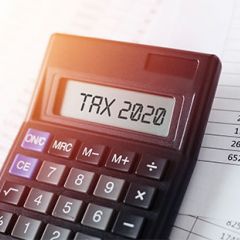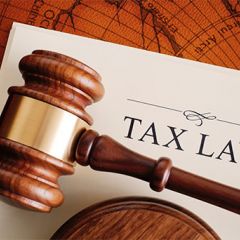Join us from 8:55 a.m. until 12:30 p.m. Thursday, Jan. 30 in Chicago or via live webcast to increase your understanding of current and ongoing state, local, and property tax issues with this informative half-day program. Attorneys with intermediate practice experience who attend this seminar will better understand: current and future property tax proposals that may affect your client; the latest court and administrative agency case updates; the new sources of tax revenue and potential tax changes that are currently being explored; the interactions between the taxpayer and governmental agencies; and much more.
CLE
-
January 23, 2020 | CLE

-
January 17, 2020 | CLE

Join us from 8:55 a.m. until 4:30 p.m. Friday, Feb. 7 in Chicago for the 2020 Federal Tax Conference. Increase your understanding of federal taxation in this full-day seminar, including how the Tax Cuts and Jobs Act was implemented in 2019, how the treasury has interpreted the Act, and what guidance is still needed. Attorneys with intermediate practice experience who attend this seminar will better understand: the regulatory updates for individuals that you need to be aware of; the recent changes to estate and gift tax law; the significant legal developments in 2019 affecting corporate and partnership taxes; the various ethical issues facing Illinois tax attorneys; the unique tax considerations for cryptocurrencies; and the options your clients have when they are unable to pay their tax liabilities.
-
January 13, 2020 | CLE

Don’t miss the 26th Annual Agricultural Law Seminar, held from 8:30 a.m. until 4:45 p.m. on Friday, Feb. 7 in Bloomington, which offers the updates you need on a number of important agricultural law issues, including Illinois and federal estate and income tax law. Attorneys with intermediate practice experience who attend this seminar will better understand: how the past years’ federal estate tax cases have impacted the agricultural community; how the 2019 federal and state income tax changes are affecting agricultural producers; the new farm bill and marijuana laws; how to negotiate and draft farm leases; the issues facing farmers on transferring farm ownership; the new Uniform Partition of Heirs Property Act; Chapter 12 bankruptcy and farm workouts; and more.
The program closes with a comprehensive look at mental health and suicide in the legal profession, including its causes, solutions, and how to help.
-
January 8, 2020 | CLE

Join us from noon until 1 p.m. Tuesday, Feb. 4, for an opportunity to learn about the importance of Google reviews, the various approaches that law firms are taking to obtain quality Google reviews from clients, and how to obtain a Google business listing. Attorneys attending this online seminar will better understand: the value of Google reviews; how many reviews your law firm needs; where Google reviews are located and how to get more of them for your law firm; why you should compare your reviews to those of your competitor; the automated process of obtaining reviews and how it might affect your firm; and what to do if you get a bad review.
-
January 2, 2020 | CLE

Join us from noon until 1 p.m. Wednesday, Jan. 22, for a comprehensive look at the basic fundamental rights of both union and non-union employees, as well as the laws surrounding labor strikes. Employment law practitioners, corporate law attorneys, human rights lawyers, and small business counsel with basic practice experience who attend this online seminar will better understand: the rights of unions in non-union facilities and public areas, including shopping malls; the rights of unionized and non-unionized workers to strike and take protected actions; the laws impacting work stoppages; and the rights of workers and employees leading up to and during a strike.
-
December 13, 2019 | CLE

Join us from 1 until 2 p.m. Wednesday, Jan. 15, for a webcast that details the confidentiality concerns that can arise throughout a litigation case involving a client with mental health issues.
Attorneys with all levels of practice experience who attend this online seminar will better understand: what qualifies as a valid mental health release of information; who can properly obtain mental health records and how; how to maintain the confidentiality of your client; how to issue subpoenas for mental health records and/or seek the testimony of a mental health provider; and when a mental health provider can make a voluntary disclosure of mental health information.
-
December 9, 2019 | CLE

Join us from 1 until 2:30 p.m. Tuesday, Jan. 14, for a webcast that details the information you need regarding criminal history background checks for school personnel.
Education law attorneys, labor and employment lawyers, and criminal justice practitioners with all levels of practice experience who attend this seminar will better understand the law, the process, and the practical considerations of conducting background checks; who conducts the background check; who is subject to the requirements; the confidentiality issues to be aware of; and the convictions that would disqualify persons for employment in education.
-
December 2, 2019 | CLE

Join us from noon until 1 p.m. Friday, Jan. 10, for an online seminar that examines the legislative changes that may affect your traffic law clients, including the recreational use of marijuana.
Traffic law attorneys, criminal defense lawyers, prosecutors, general practitioners, and new attorneys with basic practice experience who attend this seminar will better understand: the recent caselaw and legislative changes to the traffic law arena, bail reform and changes to criminal and traffic assessments and costs, the latest DUI and summary suspension caselaw, and how these changes will affect your client and practice.
-
November 25, 2019 |
CLE
Is your law firm’s growth stagnate? Your practice could have a parasite if any of the following sounds familiar: you don’t know if your cases are profitable or by how much; you keep getting interrupted by phone calls/emails and your staff is delegating to you; you have clients who are past due on payments, or worse, you are past due on invoicing; or your referrals and prospects are less than ideal.
If any of that sounds like your life as a practice owner, then you may have one or more of the four distinct parasites weakening your practice. No matter how grand your vision is for your law firm’s future, it won’t matter if you haven’t ensured that four basic business cornerstones are in place and infection-free.
-
November 19, 2019 | CLE

Join us online from 1 until 2 p.m. Thursday, Dec. 12 to learn how to advise your clients on the cannabis industry.
Cannabis applications are already more complex than any other licensed business in the country, and Illinois’ version includes additional provisions for social equity in the cannabis industry (410 ILCS 705/), which is creating interesting partnerships with people traditionally left behind in business ownership. Attorneys with basic practice experience who are looking to expand their knowledge of the cannabis industry will better understand: the different types of licenses and their terminology; how to put together a winning team for your client; home grow questions; maintaining a drug-free workplace after legalization; the issues and trends with social use, tax, and zoning; and social equity’s role in an Illinois cannabis-based businesses.

